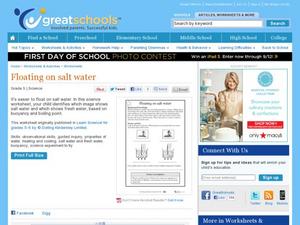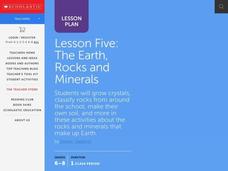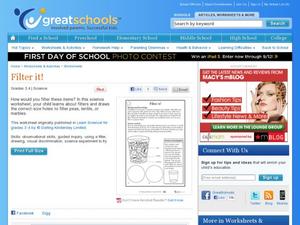Pingry School
Effect of Solutes on Boiling Point
Anyone that lives around snow knows that adding salts to water increases its melting point. Are there solutes that affect the boiling point as well? A scientific experiment has learners add different solutes to water and then monitor the...
Curated OER
Properties of Fresh and Sea Water
Middle schoolers work with three stations to demonstrate the properties of water. They explore water's boiling point, freezing point, and its ability to store heat.
LABScI
Freezing Point Depression: Why Don’t Oceans Freeze?
Can you go ice fishing in the ocean? Learners examine the freezing point of different saltwater solutions. Each solution has a different concentration of salt. By comparing the freezing points graphically, they make conclusions about...
Curated OER
Temperature Change and the States of Matter
Tenth graders observe the processes of evaporation, condensation, melting, freezing, boiling, and sublimation. They do a quantitative investigation of the freezing of water, to explore explanations that involve particles.
Curated OER
Characteristics of Crystals
In this crystals worksheet, students complete a graphic organizer by filling in the characteristics of the different crystal types including melting/boiling point and electrical conductivity.
Curated OER
Comparing Properties of Elements & Compounds
In this elements and compounds worksheet, students review the physical properties of different compounds and elements using websites for information. This worksheet has 1 graphic organizer and 1 short answer question.
Curated OER
How Does Water Cool?
How fast does water cool? First fifth graders will draw a line on a graph that predicts how fast they think water can cool from boiling. Then they plot the actual data on the same graph to see if their estimate was correct.
Curated OER
temperature and the Scientific Method Lesson Plan
Sixth graders study heat, temperature, and heat transfer. Using probeware, the teacher demonstrates boiling points. Students participate in experiments and record the beginning and ending temperatures and mass of objects. After...
Curated OER
Different Types of Changes (1.2)
In this recognizing different types of changes worksheet, students answer questions about such things as reversible change, irreversible process, climatic change, filtration process, physical change, and change in the state of a...
National Institute of Open Schooling
Solutions
Aqua regia, or royal water in Latin, is a solvent that can dissolve solid gold and platinum into a solution. Activity nine in a series of 36 allows classes to learn, through readings and answering questions, what a solution is and the...
Curated OER
Floating on Salt Water
Mixing substances together causes their properties to change. This resource illustrates that concept for fifth graders by having them consider four questions that have to do with buoyancy and boiling point. Learners begin to understand...
Curated OER
Shake, Rattle and Roll
Students compare the weathering of materials. in this weathering lesson plan, students experiment with the chemical and physical weathering of different materials. Students use salt and water as an example of how weathering occurs.
NOAA
Ocean Layers I
How is it possible for ocean water to have layers? The sixth installment of a 23-part NOAA Enrichment in Marine sciences and Oceanography (NEMO) program investigates factors that cause different water densities to occur. Experiments...
Curated OER
How Do You Dew?
Students examine how the processes of condensation and evaporation occur. They describe the relationship between heat energy, evaporation and condensation of water on Earth. They give examples of the processes of evaporation and...
Curated OER
Ice Cream in a Bag
Students discuss the three states of matter and how they are affected by temperature. They make ice cream in a bag while observing how temperature change affects the mixture. They discuss why some specimens froze more quickly than others...
Curated OER
Stacking Water
Students experiment with different salinities of water using straws and different colors of water. They collect and interpret data from the experiment.
Curated OER
Hunting for Aqueous Solutions
In this aqueous solutions learning exercise, students will conduct an experiment to determine the solubility of different common kitchen items. Students then complete 3 short answer questions.
Curated OER
Macromolecule Lab
During a macromolecule lab, young chemists perform multiple tests, including iodine starch tests, to determine if eight mystery foods contain lipids, sugars, or starches.
Scholastic
Lesson Five: The Earth, Rocks and Minerals
Apply the principles of geology to a series of collaborative, hands-on class activities. Young earth scientists learn more about igneous, metamorphic, and sedentary rocks before classifying and weathering rocks that they find....
Curated OER
Filter It!
Elementary schoolers who are learning about filtration and mixtures could use this worksheet to gain practice in filtering techniques. In it, they are asked how to manipulate a container in a way that would lead to properly filtering...
Curated OER
Solutions and Suspensions
Students explore matter by conducting an in class demonstration. In this liquid mixture lesson, students identify the difference between a solution in which a solid dissolves into liquid, and a suspension where the solid doesn't dissolve...
Curated OER
Saltwater Science
Students conduct an experiment that shows them how salt water allows things to float. In this salt water lesson plan, students mix ingredients together to create salt water and observe how it makes the oceans dense. They then interpret...
Curated OER
Matter and Change
In this matter and change worksheet, students answer 24 questions on topics such as elements, compounds, mixtures and chemical reactions. Students answer questions about the properties of matter such as their physical state and shape. In...
Curated OER
Experimenting with Physical Changes
Fourth graders explore physical changes. They discuss that physical change is a change in size, shape, or state of matter of a substance. Students explore what change takes place when two substances can dissolve each other. They observe...

























